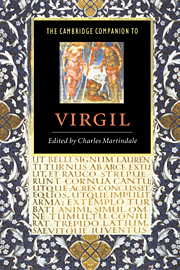Book contents
- Frontmatter
- Contents
- List of illustrations
- List of contributors
- Preface
- 1 Introduction: ‘The classic of all Europe’
- Part 1 Translation and reception
- 2 Virgil in English translation
- 3 Modern receptions and their interpretative implications
- 4 Aspects of Virgil's reception in antiquity
- 5 The Virgil commentary of Servius
- 6 Virgils, from Dante to Milton
- 7 Virgil in art
- Part 2 Genre and poetic career
- Part 3 Contexts of production
- Part 4 Contents and forms
- Dateline compiled by Genevieve Liveley
- List of works cited
- Index
- Plates
4 - Aspects of Virgil's reception in antiquity
from Part 1 - Translation and reception
Published online by Cambridge University Press: 28 May 2006
- Frontmatter
- Contents
- List of illustrations
- List of contributors
- Preface
- 1 Introduction: ‘The classic of all Europe’
- Part 1 Translation and reception
- 2 Virgil in English translation
- 3 Modern receptions and their interpretative implications
- 4 Aspects of Virgil's reception in antiquity
- 5 The Virgil commentary of Servius
- 6 Virgils, from Dante to Milton
- 7 Virgil in art
- Part 2 Genre and poetic career
- Part 3 Contexts of production
- Part 4 Contents and forms
- Dateline compiled by Genevieve Liveley
- List of works cited
- Index
- Plates
Summary
The celebrity of Virgil's works in the Roman world was immediate and lasting. The Aeneid enjoyed the rare distinction of being hailed as a canonical poem while it was still being written: 'something greater than the Iliad is being born' {nescioquid mains nascitur Iliade), wrote the elegist Propertius in the mid-20s, perhaps with a touch of irony, but anticipating the serious comparisons with Homer that would become conventional. Virgil's first appearance as a school author also dates from the 20s, when his published work still comprised only the Eclogues and Georgics; in the guise of a 'modern poet' he was lectured on by Q. Caecilius Epirota, a freedman of Cicero's friend Atticus and an intimate of Cornelius Gallus, from whom he may have derived a fondness for neoteric poetry uncommon in a schoolmaster. Caecilius probably knew Virgil, and could have had personal reasons for including him among the authors he read with his students, but his decision looks forward to the central role Virgil was to play in Roman literary education for the rest of Antiquity.
Acclaim by fellow-poets and early embalmment as a school text are not unusual fates for a major Latin poet; as much could be said, for example, of Horace, especially the lyric Horace of the Odes. What makes the reception of Virgil unique among Roman poets is the pervasive quality of his influence, which is visible both at the level of popular culture and of official ideology.
- Type
- Chapter
- Information
- The Cambridge Companion to Virgil , pp. 56 - 72Publisher: Cambridge University PressPrint publication year: 1997
- 6
- Cited by

